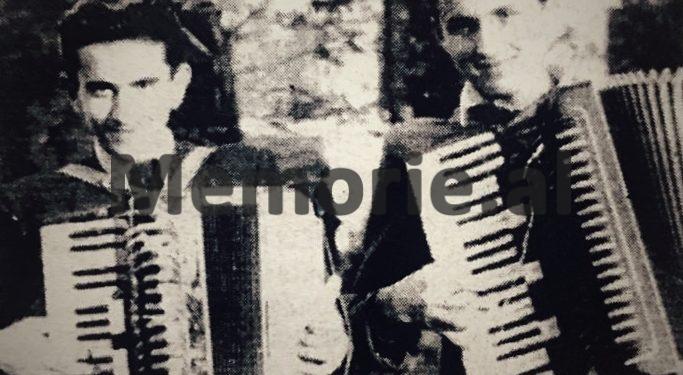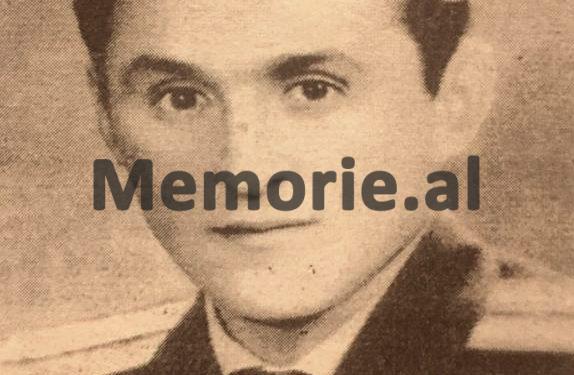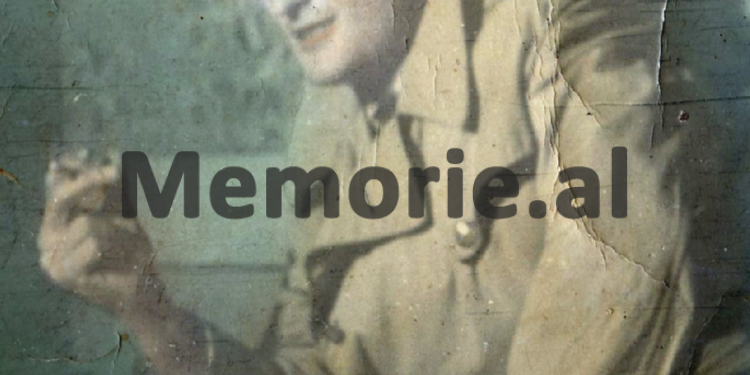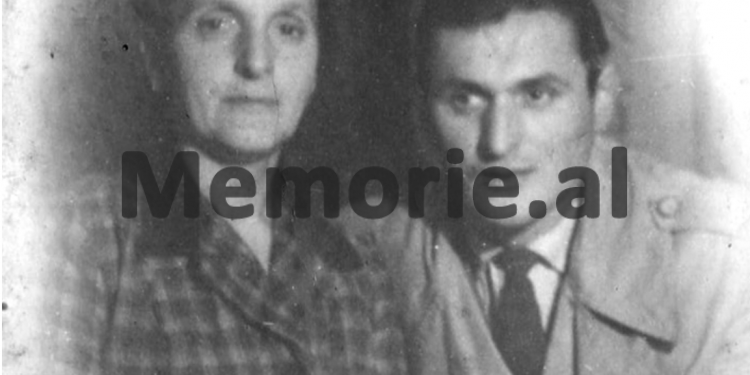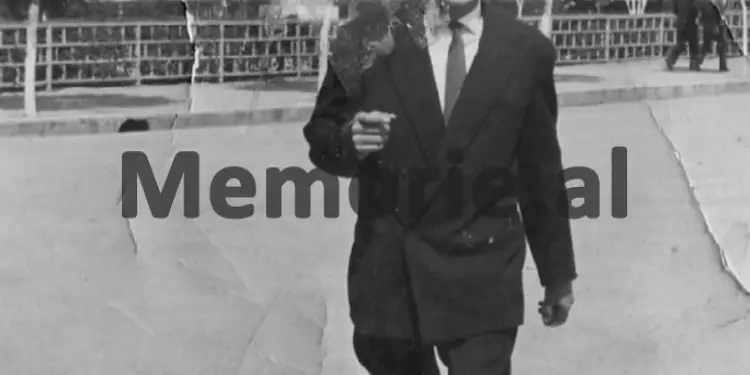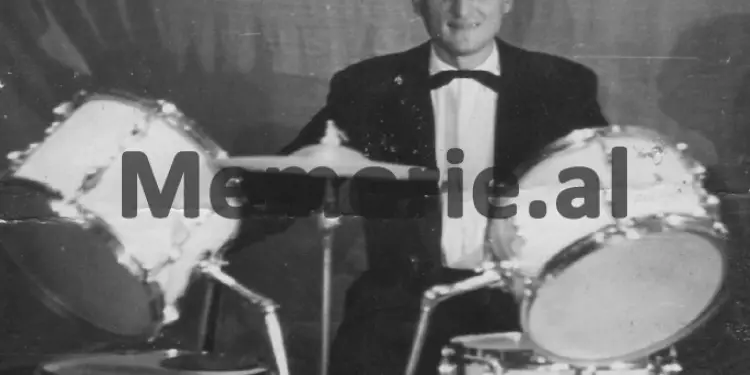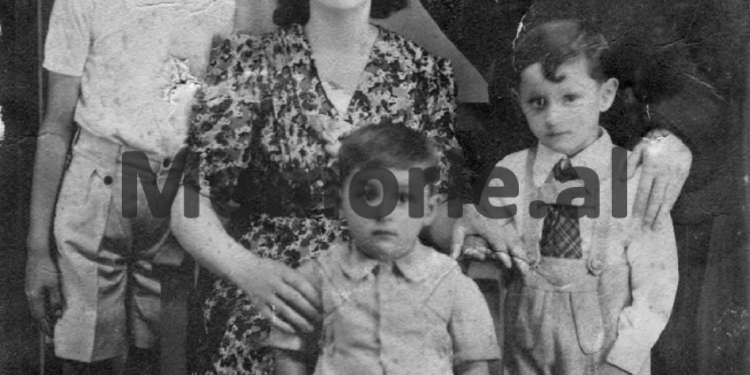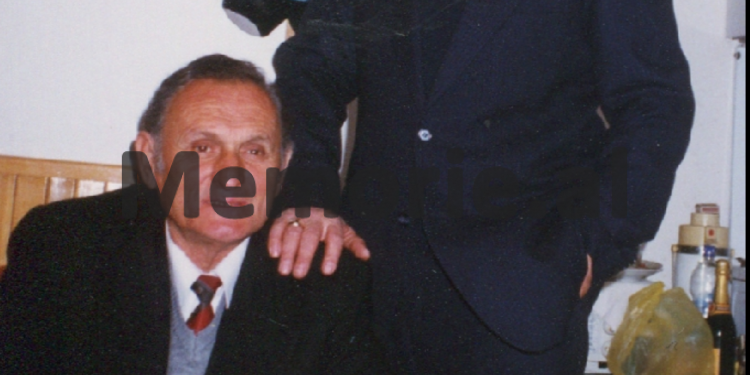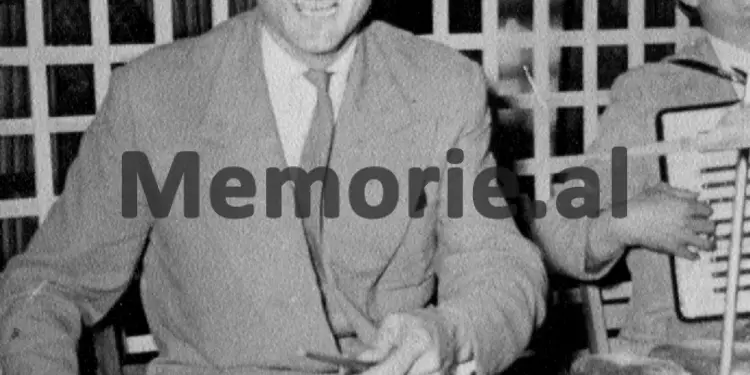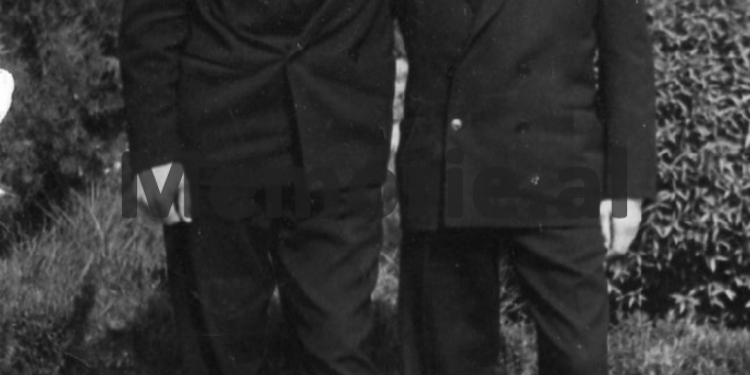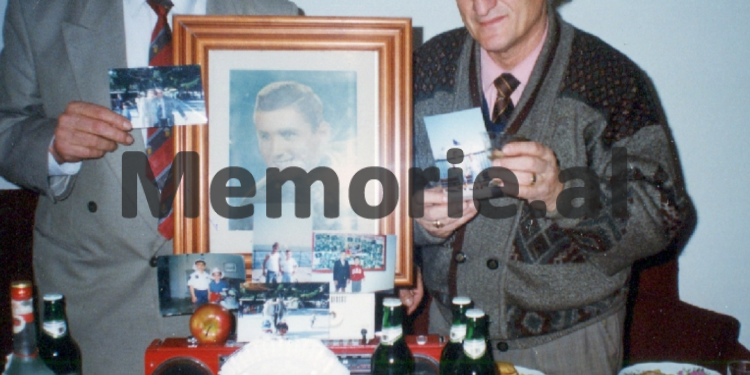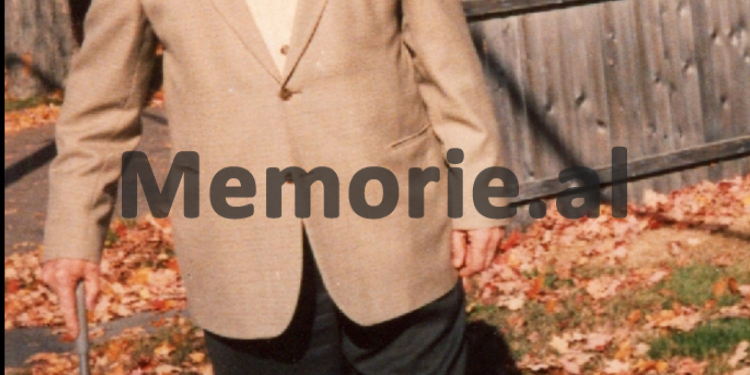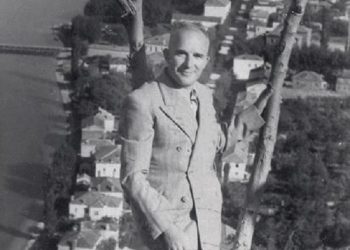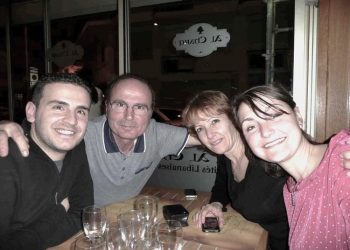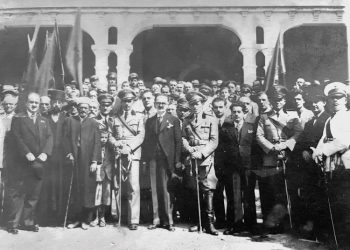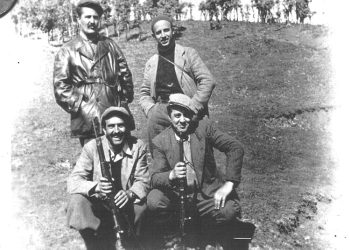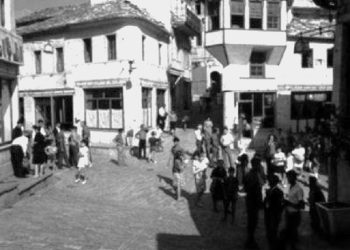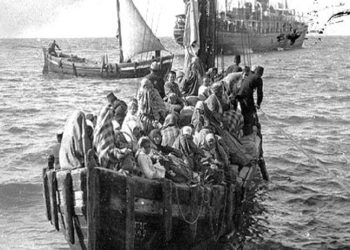Dashnor Kaloçi
Memorie.al publishes the unknown story of Gramoz Omari from the well-known Gjirokastra family, the virtuoso musician of the orchestras of Hotel “Dajti”, “Adriatic”, “Internacional”, etc., a close friend and companion of Agim Krajka, Skënder Sallaku, Skënder Plasarit, etc., who after graduating from the Faculty of Medicine in Tirana, was appointed as a professional in the Border Variety, mobilizing as an officer with the rank of lieutenant from the Ministry of Interior. All his painful story that would have a tragic end: from being appointed as a doctor at the border post of the village of Vermosh, escaping in September 1963 to Yugoslavia, working for five years as a doctor and orchestra in some of the hotels of Montenegro, Bosnia and Italy, returned in 1968 by the Yugoslav authorities under an agreement reached by the UDB with the State Security, exchanging with two Kosovar citizens the death sentence by the Military College of the Court of Shkodra, the refusal by Enver’s sister, Fahrije, to beg his brother to spare Gramoz’s life, the dictator’s response to his close childhood friend “Better to be shot than to suffer 25 years in prison”, the refusal of the guard officer in the Internal Branch of Shkodra to accept two packs of cigarettes and 500 old lek, after “the decision of the Court was executed” until the vicissitudes of his family after the ’90s to find the remains of his, but re pa re zultat ?!
It was August 1, 1968, when in the midst of a scorching heat, on the state border between Albania and Yugoslavia, at the Hani i Hotit border crossing, the Yugoslav authorities, represented by two UDB soldiers, handed over to the Albanian border side through a report, the Albanian officer, Gramoz Omari. After the proper formalities were completed, the two representatives of the Albanian side, B. Ndreu and B. Shabani, signed the deed of acceptance and “Gazi” – 69 where the newcomer was “settled”, took the winding road by Lake Shkodran. But who was Gramoz Omari, where did he come from, and why did the Yugoslav authorities hand him over to the Hani i Hotit border crossing?! What was the secret agreement between the two states that made that possible, at a time when relations between the two countries were extremely strained as they were guided by completely different ideological systems?
Who was Gramoz Omari?
Gramoz Omari was born in 1938 in the city of Elbasan, and came from the trunk of the Omari family of Gjirokastra, one of the most famous festivals of that stone city since the period of Ottoman rule. Gramoz’s father, Eqerem Omari, had studied and graduated in the early ‘30s, for Agronomic Engineering, in Grenoble, France. Never mixed with politics, both in the period of the Zog Monarchy, and after the establishment of the communist regime in Albania, he would devote himself only to his profession as a flour technologist, where he excelled and was considered one of the best specialists in country. Gramozi was the third child of Eqerem Omar, after two brothers, Beqir, and Xhemil. A few months after the end of the war, Eqeremi was summoned to Tirana for a meeting by Enver Hoxha, who proposed a high state position, but he refused, even though it was an important post in the highest communist hierarchy of the time. And this is because Hoxha knew Eqerem well as a Gjirokastra resident, but also as a relative of his brother-in-law, Bahri Omar, who had not long been sentenced to death by the Special Court and had been executed. Knowing well the intentions of Enver Hoxha, that after Bahri was shot, he tempted Eqerem to divide the Omar tribe, and to pull any of them to the side of the communist government, thus justifying in a way the shooting of Abaz Omar, Eqerem’s cousin, who was also Enver Hoxha’s nephew. Although Eqeremi refused the job offered by Enver, he started another job, already as UNRRA High Commissioner for Aid in the city of Durrës. In the street “Siri Kodra” where the Omari family settled, Gramozi who as a child would be known for his inclinations for music, among peers who played together all the time, such as: Besim Zekthi, Skënder Sallaku, Skënder Plasari, Enver Dauti, Agim Krajka, etc., who years later would become and stand out as the best actors, artists, and musicians of the country. At the age of 15, Gramozi would become known in Tirana and abroad, as one of the greatest accordion virtuosos, where together with his close friend Agim Krajka, they would become the most wanted instrumentalists in all orchestras. of the country as in: “Dajti”, “Internacionali”, “Bar-Sahati”, “Adriatiku” in Durrës, etc. Seeing the fame that Omari and Krajka gained, the Ministry of Internal Affairs, which at that time was omnipotent, called them both and founded the Border Variety, where of all the artists, only Omari and Krajka would be paid as professionals. Thanks to the virtuoso orchestrators of well-known actors like Enver Dauti, who then collected Border Estrada, she would become very popular and would gain a fame all over the country.
Graduated from the Faculty of Medicine, and escaped to Yugoslavia
After several years of work in the Border Variety, Gramozi arrives and finishes high school in night school, and in 1958, thanks to his great name, he was granted the right to study at the Faculty of Medicine in Tirana, where he would graduate. and older brother, Xhemili. Never giving up his passion for music, Gramozi finished with high results, and graduated in Medicine in 1962. Shortly after graduating, in September of that year, the Ministry of Internal Affairs to have its own staff, promotes him to officer with the rank of lieutenant, and keeps him available, assigning him to Tirana in a specialization course for surgery at the Central Army Hospital. At that time, Gramzo’s father, Eqeremi, while working in Tirana in the Ministry of Agriculture, as one of the best specialists in the production of bread factories, was fired. The pretext for the leave was as if he had received a monthly disability pension more than he deserved, since he was ill and working four hours, while the other four hours were paid by Social Security. The real reason for the dismissal was the class war, which at that time was very tense, as the cadres who had studied in the Soviet Union were returning to the country and all those who had studied in Western countries were being fired, (in the period of the Monarchy and that of the conquest of the country), who were seen as people highly suspicious of the communist regime. After his father was fired, Gramozi was transferred from Tirana to Shkodra, where he was assigned as a military doctor at the Vermoshi border post, in the northernmost part of the country. A few days after Gramozi had gone to his new job, very depressed by his father’s problem and leaving Tirana, where he had left friends, relatives, family, and above all the accordion and orchestras where he had become quite known, he decides to leave Albania, fleeing to Yugoslavia. Which, of course, made the video an overnight sensation. Gramozi must have made the decision to escape in a very desperate state and from a great psychological pressure, from the environment in which he happened to be, where the possibility of any arrest of his father, Eqerem, or him was not ruled out. himself, from the political position the Omari family held, having two shot by the family and several others fleeing to the US. According to the testimonies of his brother, Beqiri, the idea to escape from Albania, Gramoz must have been born there when he arrived at the post of Vermoshi, because during those years he worked in the Border Variety, he had given performances dozens of times. various at almost all border posts, but had never attempted such a thing. Gramozi had never thought of escaping, although often foreign tourists at the hotel “Dajti” and “Adriatiku” in Durres, amazed by his virtuosity in the accordion, had lured him with various promises, making them known that if he was out in their countries, he would have a great fame and would be very rich “, recalled his brother, Beqiri. While two of his colleagues and close friends of Gramoz, the great actors Skënder Sallaku, and Skënder Plasari, among others have testified to us: “Often in the many shows we have given at the border posts, in our free time, sometimes together with Gramoz, the three of us, approached the edge of the border, where you could easily cross, without entering the thorn in the foot, but just as we had gone there without any intention, we returned back inside the Albanian territory. “So, Gramozi, if he had wanted, would have escaped and would not have waited to be appointed one day as a military doctor in the post of Vermoshi”.
Lieutenant Gramoz Omari, 5 years in Yugoslavia
Just three days after Gramozi had gone to the Vermosh summer border post, still without handing over his duty, on September 6, 1963, at 8.30 am, he crossed the border and crossed into Yugoslav territory, where he is under the barrage of Yugoslav border guards’ machine guns, who, seeing his unresponsiveness, cease firing and immediately seize him, escorting him to their border post. After the usual procedures and interrogations of border trespassers, Gramozi is picked up and escorted by two UDB officers, sent to a small camp in Ivangrad. The next day, in the company of two soldiers, Gramozi is sent to the city of Titograd, where he is accommodated in the hotel “Cerna Gora”, a day later, he is taken and he is escorted back to the camp “Leskopolje”, not far from the capital. That camp served as a place of residence for several days for the refugees, who at that time were not few, and mainly from the area of Shkodra and its Highlands. Seven days later, a UDB officer named Aco Mursolovic interrogated Gramoz, insisting he knew: what did he have to do with Luan Omar, Enver Hoxha’s sister’s son, and what was the numerical presence? of Chinese advisors in Albania, etc. After three months of investigation, Gramozi was released after informing them that his intention was not to stay in Yugoslavia, but to go to the United States, where he had some relatives. After leaving the camp, Gramozi moved to the town of Niksic, where he immediately started working as a musician at the Onegoshti Hotel. After three months in this hotel, he started working as a doctor in Niksic Hospital, assisted by two Albanian brothers from Shkodra, but without having a degree from the Medical University of Tirana, he could not work much in that hospital. So, he left for other cities in Yugoslavia, such as Sarajevo, Zadar, Zagreb, and Maribor, working in various hotels as a musician, but occasionally in hospitals as a doctor. In September 1966, after working in various well-known music societies, Gramozi started working as a music teacher at a high school in Split, where he worked for a year. During this time, he was a teacher, he worked at night in the orchestra of the hotel “Marjan”, of this city, which was frequented by many local and foreign tourists, mainly from West Germany. 1968 would also be Gramoz’s last year in Yugoslavia, a period in which he intensified his correspondence with relatives dating back to the time of the Zog Monarchy as economic emigrants to the United States and Turkey. So, in a letter he sent to his aunt in Turkey, among other things, he wrote, “Here with me, lives a young friend, who has come now, his name is Tonin Prosi. He has spent 10 years in prison in Albania. “I was very happy for what he once saved from the communist regime.” In June 1968, Gramozi went to Maribor, Slovenia, near the American consulate, where he presented the documents to emigrate to the USA, as a political immigrant. The American consul himself promised him a visa to the USA, as soon as the guarantee came from his relatives from the USA. During this time, in anticipation of the arrival of the guarantee, he went to Italy, where he worked as a firmamonist in several popular bars and hotels on the Apennine Peninsula. According to the testimony of his brother, Beqir Omar, that work and virtuosity of Gramoz on the instrument of accordion, impressed one of the greatest masters of Italy named Mario, who, promised Gramoz that he would issue him a residence permit and of employment for Italy.
Victim of secret agreement between UDB and State Security
On July 30, 1968, while Gramozi was working in the orchestra of the Novakkiroke club, waiting for a guarantee from the USA, a UDB officer went to his room and told him to show up at his office., as he dealt with the problems of immigrants. In that office, Gramoz was received by two police officers of the Ministry of Interior, who told him: “You will come with us, as the authorities in Titograd ask us for an explanation.” Without any shadow of a doubt, Gramozi immediately obeyed their way and they set out for Titograd by train and when they got there they sent him to the city jail where he spent that night in a single room. The next day at 8 o’clock in the morning he was put in a black covered “Jeep”, and sent to Hani e Hotit. Also on July 31, while Gramoz Omari, put in the UDB car, was traveling against his will towards the Albanian border, only 46 km. away from Tirana, in the small town of Laç, in the mansions of former General Preng Pervizi (Commander of the Albanian National Army during the German occupation), which was already used by the State Security as a Center for Isolation and Filtering for immigrants Kosovars ”, two Kosovo Albanians, were preparing to leave their cells to be exchanged at the border. Transported by a “Gaz” 69, of the Directorate of Internal Affairs of Shkodra, they would travel to Hani i Hotit, where according to the agreement between UDB and the Albanian State Security, they would be exchanged with Gramoz Omar. After the necessary procedures and formalities, the vehicle “Gaz” where the former border officer Gramoz Omari was “settled”, took the road to the city of Shkodra and stopped in the yard of the Internal Affairs Branch, where her superiors had ordered that no effective stood in the courtyard nor in its corridors. From that day, the investigation process against Gramoz Omar began where, in addition to those from Shkodra, a group of officers and investigators from Tirana had come
Military Court in Shkodra: Omar is sentenced to death
After three months of the investigation, Gramoz Omari appeared before the court on November 11 of that year, the Military College of the Shkodra Court consisting of F.S., N.H., and E.N., and with prosecutor Nj. Mr., gave the verdict against him, sentencing him to death, shooting, accusing him: “for high treason against the homeland”, “revealing military secret”. etc. While Omari had been handed over by the Yugoslav authorities in Albania for four months and had appeared in court where the decision with the capital sentence was communicated to him, his family in Tirana had no knowledge about this, as they had not been notified by the competent authorities… The Omari family found out about his “return” by chance, when a relative of theirs had seen a date posted at the High Court in Tirana, the date of the review of the request for pardon of Gramoz’s life. Three days before the New Year 1968, Gramoz’s older brother, Beqiri, who at that time was working as a musician on the State Variety in Tirana, secretly enters through the windows in one of the wards of Hospital no. 1 in Tirana, (pavilion reserved for the families of the senior leadership of the ALP), where Fahrije Omari, the sister of Enver Hoxha and at the same time the widow of Bahri Omari, was hospitalized. According to Beqiri’s testimony, he told her about the decision of the high state bodies to shoot his brother, Gramoz, emphasizing several times that this thing, that decision, could only be returned by her brother. , Enver Hoxha. Fahrija addresses Beqir with great regret: “I cannot tell Enver that I know he does not listen to me. “He has no mercy on anyone anymore, because he shot my husband and did not forgive me.” After Fahrije’s words, Beqiri realized that everything was in vain and left. On the same day, the father of Beqir and Gramoz, Eqeremi, met Skënder Topulli, a well-known dentist originally from Gjirokastra, who was also a close friend of his, and at the same time, a close friend of the dictator Enver Hoxha. Skënderi did not hesitate at all and promised his childhood friend that from that day he would try to meet Enver Hoxha, and say his words to him. Dr. Skënder Topulli was one of the few, if not the only one, who could go to Enver without the usual procedures to which the members of the Politburo, as well as the ministers, were subjected. According to the testimony of Beqir Omar, Dr. Topulli went to Enver Hoxha’s villa that day and from the beginning told him the reason why he had gone, saying in the form of a prayer: “I forgive the life of that little boy of Eqerem, because he is very young, only 40 years old”. Hoxha, without expressing any surprise (which suggested that he was inside the case), extending the pack of cigarettes to his close friend since childhood, replied: “Doctor Skënderi, better to be shot, rather than 25 years in prison. After these words, Dr. Topulli realized that he had to change the conversation with him, especially since it was the first time that Enver did not address him directly by name, but: Doctor Skënderi?! Two days after the New Year 1968, his brother Beqiri, traveled to the city of Shkodra and went to the Internal Affairs Branch, presenting himself at the counter of the guard officer, where he handed over two packs of cigarettes and 500 old lekë, for his brother, Gramozin. But while Beqiri was waiting for the service policeman to write them down in the relevant notebook, he told him, “The decision of the People’s Assembly has been implemented”. And unfortunately, this was the case, because two days ago, on the night of December 31, 1968, a firing squad of the Shkodra Branch of Internal Affairs, with the vehicle that was often used in those cases, had stopped near a military unit somewhere in Zall i Kirit, and had performed the “formalities with the procedure” given to him by the law in force. Which the Omari family would learn just a few days later when they met the prosecutor, Nj. Mr., who calmly told him: “Yes, I was the prosecutor who gave the death sentence, and I participated in his execution, as this is my duty.”
Consequences of the Omari family, and body, still uncultivated
A few days after Gramoz’s execution, his brother, Beqiri, was fired from his job at the State Variety Show, and together with his parents he was interned in the village of Sheq-Marinzë in Fier. Likewise, the other brother, Xhemili, who was a doctor in Elbasan, is interned in the villages of this district. But for the Omari family, it did not end there, as a few days after the internment, Beqiri was arrested and sentenced to 8 years in prison for agitation and propaganda, and while he was serving his sentence, their two parents died in deep misery in the barracks of them in exile. After the 1990s, Gramoz’s two brothers, Beqiri and Xhemili, set out in search of his remains. They both force the prosecutor Nj. Mr., who tells them the place of execution, but not the place of burial, which according to him, “was not his competence”. Regarding this event, Eshref Kepa, from Shkodra, among others, testified: “It was the first days of January 1969 and I had gone to the ward in Zall e Kirit to get the letter of the funeral. While the guard officer was filling it for me, near the offices on a pebble shore, some street dogs were barking. The guard officer seemed to be annoyed by the sound of the dogs barking and interrupted the filling of the foil sheet, addressing some of the soldiers who were there, to scare the dogs and drive them away. Then he sat down again at the desk to write and addressed me in good faith, saying: ‘Those of the Branch, two days ago, shot here the priest of Velipoja and a military doctor, who has been returned by the UDB’. I, after receiving the letter of the bird, leaving from there I saw there these dogs were just a corpse upside down and I recognized him from the jacket that belonged to the priest of Velipoja “. Kepa’s testimony coincides with the testimony of an old friend of the Omari family in Tirana, who insists that: “Gramoz’s body, then after the shooting, came to our morgue in Tirana”, but even there it is not officially confirmed by the archival documents of Interior Ministry, though the doctor insists on his version. Maybe so, as 40-year-old Gramoz Omari would serve Medicine, not just alive. And when 52 years have passed since the distant December 31, 1968, in the house of the Omari family, the New Year is still not celebrated, because, the knocking of the glasses in their ears, sounds like a barrage of bullets…! /Memorie.al




